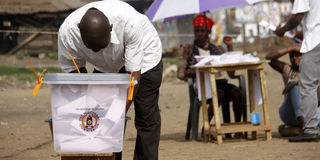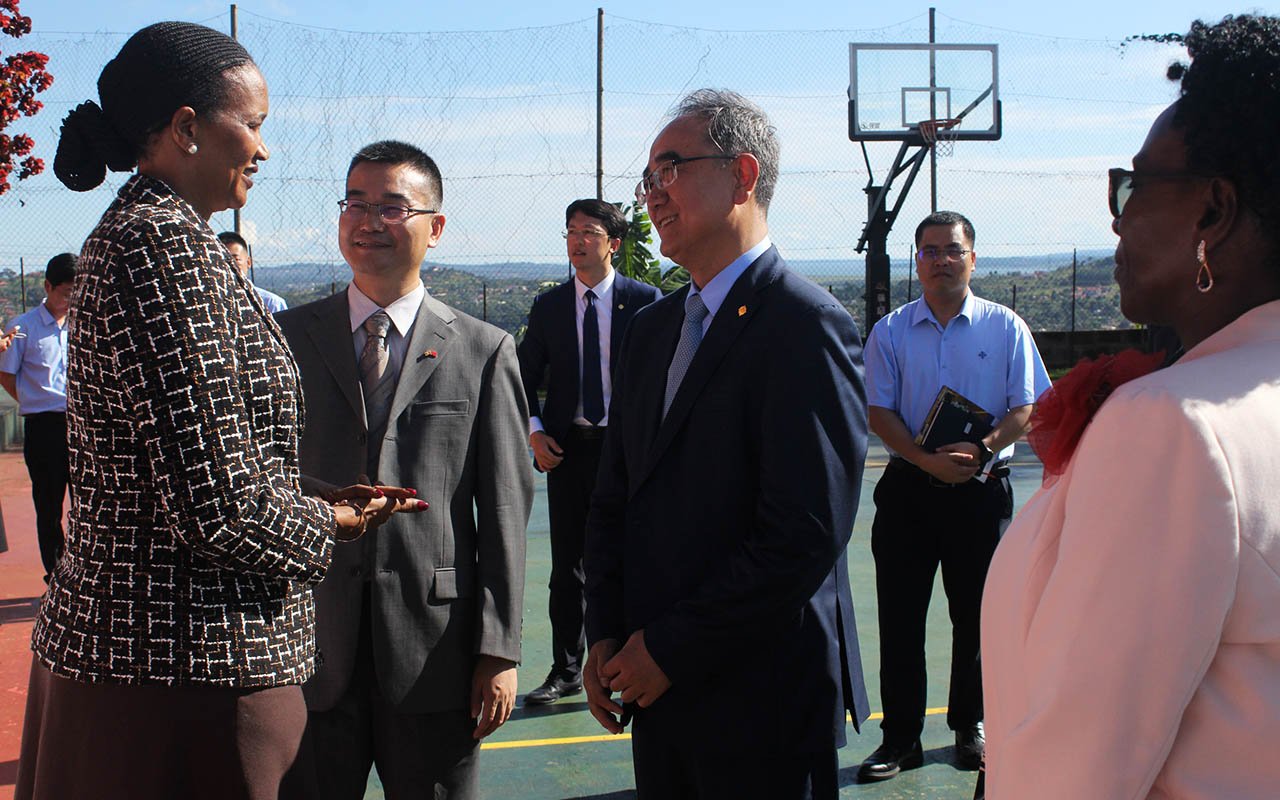Most expensive regions for elections named

A voter casts his vote at a polling station at Katwe playground in Kampala during the 2016 presidential elections. PHOTO/ FILE
What you need to know:
Candidates in Western Uganda spend more compared with those in other regions.
The Public Policy Institute (PPI) has revealed Uganda’s most and least expensive regions for parliamentary and District Council (LC5) elections.
The findings are contained in a report titled, The impact of the cost of politics on inclusive political participation in Uganda.
The research funded by the Westminster Foundation for Democracy (WFD) and the Netherlands Institute for Democracy (NIMD) shows that Western Uganda is the most expensive region for anyone to contest for a parliamentary seat while Eastern Uganda was rated the least expensive.
“Parliamentary candidates in the Western region spent up to Shs570m for both primary and general elections, while aspirants in the Eastern region recorded the lowest levels at Shs315m,” the report reads in part.
Central Uganda came second with a candidate spending Shs489m on average while the Northern region was third with a candidate spending Shs306m.
The report is based on research conducted in the last six months towards the 2016 General Election to establish how much money parliamentary contestants spent in the electoral process. A total of 300 candidates were interviewed.
“To win a parliamentary seat, the study estimated that, on average, candidates in the 2016 elections spent Shs484.7 million for both the primary and general elections. On average, successful candidates outspent rivals by a difference of Shs194.5 million,” the report states.
Candidates who contested on the National Resistance Movement (NRM) party ticket spent more than their Opposition counterparts.
“NRM candidates spent Shs48m while their Opposition counterparts spent Shs309 million (Democratic Party), Shs236m, (Forum Democratic Change) Shs43 million (People’s Progress Party) and Shs184m (Uganda People’s Congress),” the report adds.
Costs for LC 5 candidates
The report showed that candidates vying for LC5 chairperson positions from the Central region incurred the highest costs of Shs435m on average, followed by northern region at Shs305m, Western region with Shs253m while Eastern region was the least expensive for candidates at Shs135m.
When asked about the sources of their funding, candidates told researchers that they used personal resources, loans and money drawn from business interests, funds from political parties, social groups plus resources from family and friends.
Candidates mostly spent the money on transport, publicity, media, communication and social contributions.
Maintaining office
The second phase of the research conducted between 2016 after the general election and February 2020 to establish the financial burden shouldered by elected MPs and LC5 chairpersons reveals further expenses in maintaining an office.
“The average cost of maintaining office on a monthly basis is Shs32m for parliamentary holders. Overall, the most expensive region in which to hold a political position was Central at Shs48m, followed by Western at shs30m, Northern at Shs28m and Eastern at shs25m,” the report states.
Groups affected
Of the 300 people sampled, the majority said the high cost of contesting for political positions disadvantages the youth, women and other marginalised groups such as persons with disabilities (PWDs) who may not have the ability to match their competitors’ financial muscle.
“Seventy five per cent thought that young people were excluded by the cost of politics in Uganda, while 62 per cent believed that women were excluded for the same reason. This also corrupts voters’ ability or willingness to seek political accountability for the delivery of public services,” the report states.
Reasons for high costs
Weak enforcement of rules on campaigning and parliamentary privileges and salaries for MPs serve as incentives for candidates to spend more with hope to recover the money once they ascend to Parliament.
Ignorance of electorate about their rights was also blamed for the large sums of money splashed during campaigns to secure political seats.
Politicians react
The chairperson of Inter-Party Organisation for Dialogue (Ipod) and also president of Justice Forum (JEEMA), Mr Asuman Basalirwa, said ignorance of the electorate and absence of adequate civic education among voters is the reason candidates spend heavily.
“So MPs have to virtually become ATMs because of the broken systems we have in the country,” Mr Basalirwa said.
He added: “It is a crisis that we live with. If the local governments are not empowered to do their mandate and deliver, then pressures we (as MPs) face on ground will not go away.”
The leader of Alliance for National Transformation (ANT), Maj Gen (rtd) Mugisha Muntu blamed government for fueling the high cost of elections.
“It is a frightening situation and if this picture continues like this, we are headed into a crisis. Government bribes MPs and then MPs bribe voters and therefore weakens the system of holding people or fighting the vice,” Gen Muntu said.




